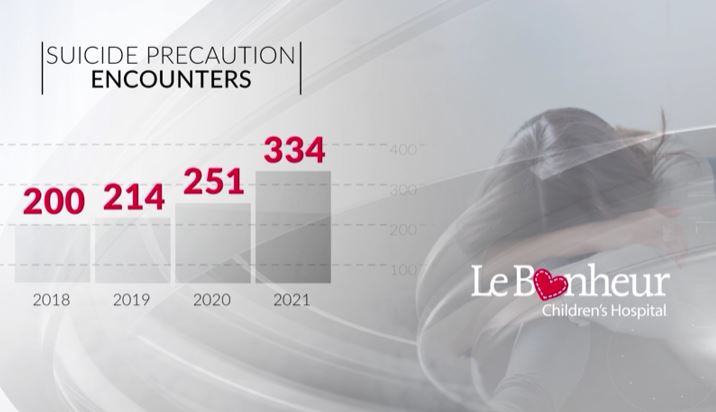MEMPHIS, Tenn. — Le Bonheur Children’s Hospital is reporting a startling increase in suicide attempts by children over the past two years.
New data shows more and more youth are hitting rock bottom during the pandemic.
“The COVID-19 pandemic has taken away a good bit of children’s ability to grow and develop,” said Dr. Tracee Ridley-Pryor, Psychiatric Mental-Health Nurse Practitioner, Le Bonheur Children’s Hospital. “The trend shows children are having difficulty coping, and we think this is partially due to isolation and increased anxiety over the last two years.”
Research from Le Bonheur shows a drastic spike in what they call “child suicide precaution encounters.”
- In 2018, there were 200 visits for suicidal ideation or attempts.
- In 2019, 214 visits.
- In 2020 there were 251.
- In 2021, that jumped to more than 334 visits.
Kim Mitchell’s son Harley was only 15 when he took his life after his mentor had a heart attack.
“The day of, he got suspended from school,” Mitchell said. “It wasn’t anything bad, but he just felt like it was the end of the world, I guess.”
The tragedy didn’t end there. Four years later, her husband also took his life.
Falling on her family and faith, Mitchell volunteers at the Memphis Crisis Center, hoping to break the stigma of suicide.
“Even in fits of anger people say, ‘Well I just don’t want to live,’ or whatever. Take that seriously go to the root of it,” Mitchell said.
Mike LaBonte, director of the Memphis Crisis Center said his agency has seen an uptick in calls to its suicide prevention lifeline.
“I always say we are in the hope building business,” LaBonte said.
He believes children are bearing the burden of adults, from the unrealistic pressures of social media, to racial tensions and at-home stress.
“Most of these individuals, they don’t want to die — they simply want the pain to end,” LaBonte said. “So this is really about ameliorating, or trying to reduce, the pain our children are experiencing as a result of all these changes that we’ve been going through as a society the last two years.”
While each encounter and child is different, the experts encourage paying attention to signs like mood swings, and for families to realize the healing power in listening.
“I think sometimes as parents and caregivers we think our children always want us to fix the problem, but sometimes they just want us to listen they just want to feel safe,” Ridley-Pryor said.
Need help?
If you know anyone in need of help, you can call the Memphis Crisis Center at (901) 274-7477 or the National Suicide Prevention Lifeline at 800-273-8255. You can also text Home to 741741 to the Crisis Hotline for help.


















